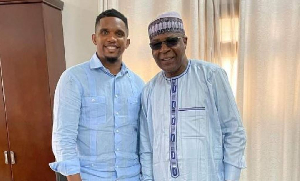In one of the few referendums on sovereignty to be held in Africa, in 1961, the people of the British colony of Southern Cameroon voted to join the French territory of Cameroon, while the separate territory of Northern Cameroon opted to join Nigeria.
More than half a century later, some English-speaking Cameroonians want independence, saying they face discrimination by the French-speaking majority.
"The conspiracy between the UK and France denied us the option of independence. Now, the British are being haunted here," independence campaigner Ebenezer Akwanga told the BBC.
'Enemy of your enemy' "They are all Anglo-Saxon, but the Scottish are having their own referendum with an in/out option. Why can't we?" But analysts say there is unlikely to be a "domino effect" of independence referendums across Africa.
The southwest of Cameroon is an English-speaking corner of a Francophone country. Its population is one of many across the world that wouldn't mind drawing its national football team from a smaller pool of talent, if it meant that they were no longer associated with a government that continues to marginalize and persecute them.
The Southern Cameroons National Council (SCNC) campaigns for the independence of this region from the rest of Cameroon. They feel pretty strongly about it, too, as evidenced by the fact that they haven’t given up despite being outlawed, tortured, and even killed for their membership of the group.
The desire for an independent nation state goes back, predictably, to the end of empire. Having scrambled into Africa, the European powers scrambled back out, leaving a set of artificially carved up states behind them. French Cameroon got its independence in 1960 and then, on October 1, 1961, the time came for British Cameroons to be divided. The northern part joined Nigeria and the southern part joined French Cameroon.
The formerly British area of the country had its own autonomy as part of a federal Cameroon at first, but in 1972, much of this autonomy was removed by the government of Ahmadou Ahidjo, which pushed through the replacement of the federal constitution with a unitary one.
In 1982, Paul Biya became president of Cameroon and over time he created a one-party state, centralizing powers. In the early 90s, he accepted the introduction of multi-party politics but managed to hang on to undisputed power. He is still president today, winning elections against a divided opposition, amid deep voter apathy and accusations of vote rigging.
Actualités of Tuesday, 23 September 2014
Source: cameroon-concord.com
Scottish referendum vote stimulates S. Cmr’ians for independence













